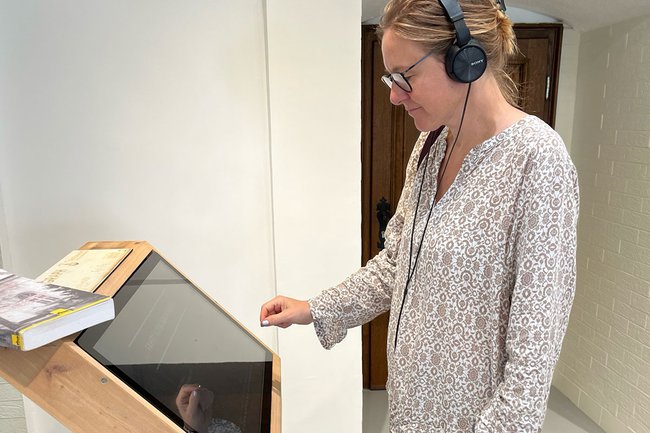New Approaches to Digital History Conveyance
Biographies Retold in a Regional Context

A research project of the St. Pölten University of Applied Sciences and the University of Vienna explored how biographies can be digitally taught in a regional context. This resulted in a prototype that digitally processes biographical data and tells stories with it in a museum of local history, and a book that summarises the findings of the research project.
On 10 May, the book titled “Digitale Erinnerungsräume Gegen das Vergessen” (digital spaces of remembrance against forgetting) will be presented and discussed at the town museum of Groß-Enzersdorf.
Exploiting the Digitalisation
The project “RegioBioGraph” examines the potentials that the ongoing digitalisation holds for the conveyance of local history. The researchers developed narrative forms combining film, modern archives, and data visualisation.
Citizens‘ Valuable Treasures
Citizen science archives of local history such as the “Topothek” have come to provide comprehensive data sets and audiovisual data, thus raising the question of how archives of this kind can be used for storytelling.
A lot of material and knowledge that are relevant for local history are in private hands, and the Topothek is a platform where the public is involved in collecting and processing them before making them visible online.
Processing Material, Sharing Knowledge
The research project RegioBioGraph studied how knowledge and data treasures can be processed and used for imparting knowledge.
Emphasis was on, for example, how new tools can be used to teach biographical and socio-historical contexts, which forms of data processing it takes to present such an archive in an interesting manner, and how people can thus gain a better understanding of history.
From Film to Data Visualisation
“Film’s ability to conserve events and rearrange them in the form of a montage has characterised the approach to history for large parts of the 20th century. Within the framework of the progressing digitalisation, however, we now ask ourselves to what extent the wide range of narration approaches can be combined with techniques dedicated to the presentation and linking of data”, explains Georg Vogt, Head of the research group for Media Creation at the St. Pölten UAS’ Institute of Creative\Media/Technologies.
Prototype for New Narrative Forms
In a transdisciplinary dialogue, the project developed the basics of a new narrative form. The project resulted in a prototype of a “RegioBioGraph” that is capable of creating narratives based on certain questions. This prototype is currently being tested at the town museum Groß-Enzersdorf.
Two case studies were selected for the tests and presentations. The first one pertains to the historical Jewish community in the Lower Austrian town Groß-Enzersdorf, while the second one works with biographies from the documentary film “Über Weiter Leben” that addresses the lives of Holocaust survivors after their return to Austria.
Based on the case examples and in-depth research, the project team examined dramaturgical and narrative concepts and implemented them using the possibilities of data visualisation.
Book Presentation
On 10 May 2025, the book with the title “Digitale Erinnerungsräume gegen das Vergessen“ will be presented and then discussed at the town museum of Groß-Enzersdorf.
Cooperative Research Project
Partners in the project were the archive and the theatre history collection of the Department of Theatre, Film and Media Studies of the University of Vienna. Birgit Peter, Head of the archive and the collection, was also the initiator of the film project “Über Weiter Leben” which received funding from the Gesellschaft für Forschungsförderung Niederösterreich (GFF).
Anthology
The findings and results of the research project have been published as an article in this anthology:
“Digitale Strategien zur Erschließung prekärer Bestände. Über Erzählen, Ausstellen, Partizipieren”
Birgit Peter, Georg Vogt, Clemens Baumann, Klaus Illmayer, Alexander Rind, Sara Tiefenbacher (eds.)
V&R unipress, Vienna University Press, 1st edition 2025, 2024
Manuscripta theatralia – volume 004
354 pages, with 22 illustrations, ISBN: 978-3-7370-1759-6
Available as book (EUR 60.00) and PDF (open access)
More information about the book
Project RegioBioGraph. Digital history mediation at the interface of cinematic biography and data visualization

FH-Prof. Mag. Dr. Georg Vogt
Senior ResearcherMedia Creation Research Group
Institute of Creative\Media/Technologies Department of Media and Digital Technologies
